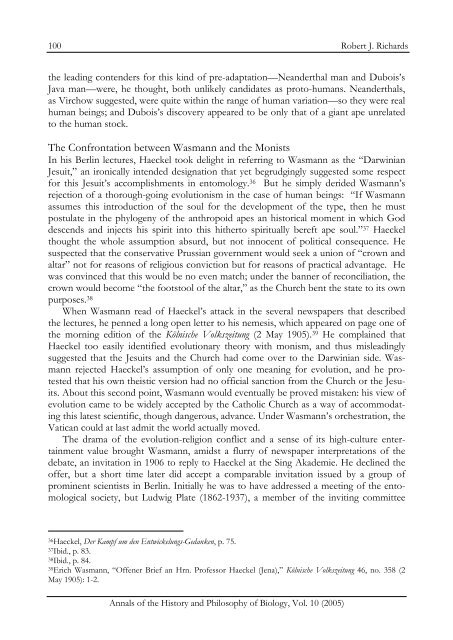Annals of the History and Philosophy of Biology
Annals of the History and Philosophy of Biology
Annals of the History and Philosophy of Biology
You also want an ePaper? Increase the reach of your titles
YUMPU automatically turns print PDFs into web optimized ePapers that Google loves.
100<br />
<strong>Annals</strong> <strong>of</strong> <strong>the</strong> <strong>History</strong> <strong>and</strong> <strong>Philosophy</strong> <strong>of</strong> <strong>Biology</strong>, Vol. 10 (2005)<br />
Robert J. Richards<br />
<strong>the</strong> leading contenders for this kind <strong>of</strong> pre-adaptation—Ne<strong>and</strong>erthal man <strong>and</strong> Dubois’s<br />
Java man—were, he thought, both unlikely c<strong>and</strong>idates as proto-humans. Ne<strong>and</strong>erthals,<br />
as Virchow suggested, were quite within <strong>the</strong> range <strong>of</strong> human variation—so <strong>the</strong>y were real<br />
human beings; <strong>and</strong> Dubois’s discovery appeared to be only that <strong>of</strong> a giant ape unrelated<br />
to <strong>the</strong> human stock.<br />
The Confrontation between Wasmann <strong>and</strong> <strong>the</strong> Monists<br />
In his Berlin lectures, Haeckel took delight in referring to Wasmann as <strong>the</strong> “Darwinian<br />
Jesuit,” an ironically intended designation that yet begrudgingly suggested some respect<br />
for this Jesuit’s accomplishments in entomology. 36 But he simply derided Wasmann’s<br />
rejection <strong>of</strong> a thorough-going evolutionism in <strong>the</strong> case <strong>of</strong> human beings: “If Wasmann<br />
assumes this introduction <strong>of</strong> <strong>the</strong> soul for <strong>the</strong> development <strong>of</strong> <strong>the</strong> type, <strong>the</strong>n he must<br />
postulate in <strong>the</strong> phylogeny <strong>of</strong> <strong>the</strong> anthropoid apes an historical moment in which God<br />
descends <strong>and</strong> injects his spirit into this hi<strong>the</strong>rto spiritually bereft ape soul.” 37 Haeckel<br />
thought <strong>the</strong> whole assumption absurd, but not innocent <strong>of</strong> political consequence. He<br />
suspected that <strong>the</strong> conservative Prussian government would seek a union <strong>of</strong> “crown <strong>and</strong><br />
altar” not for reasons <strong>of</strong> religious conviction but for reasons <strong>of</strong> practical advantage. He<br />
was convinced that this would be no even match; under <strong>the</strong> banner <strong>of</strong> reconciliation, <strong>the</strong><br />
crown would become “<strong>the</strong> footstool <strong>of</strong> <strong>the</strong> altar,” as <strong>the</strong> Church bent <strong>the</strong> state to its own<br />
purposes. 38<br />
When Wasmann read <strong>of</strong> Haeckel’s attack in <strong>the</strong> several newspapers that described<br />
<strong>the</strong> lectures, he penned a long open letter to his nemesis, which appeared on page one <strong>of</strong><br />
<strong>the</strong> morning edition <strong>of</strong> <strong>the</strong> Kölnische Volkszeitung (2 May 1905). 39 He complained that<br />
Haeckel too easily identified evolutionary <strong>the</strong>ory with monism, <strong>and</strong> thus misleadingly<br />
suggested that <strong>the</strong> Jesuits <strong>and</strong> <strong>the</strong> Church had come over to <strong>the</strong> Darwinian side. Wasmann<br />
rejected Haeckel’s assumption <strong>of</strong> only one meaning for evolution, <strong>and</strong> he protested<br />
that his own <strong>the</strong>istic version had no <strong>of</strong>ficial sanction from <strong>the</strong> Church or <strong>the</strong> Jesuits.<br />
About this second point, Wasmann would eventually be proved mistaken: his view <strong>of</strong><br />
evolution came to be widely accepted by <strong>the</strong> Catholic Church as a way <strong>of</strong> accommodating<br />
this latest scientific, though dangerous, advance. Under Wasmann’s orchestration, <strong>the</strong><br />
Vatican could at last admit <strong>the</strong> world actually moved.<br />
The drama <strong>of</strong> <strong>the</strong> evolution-religion conflict <strong>and</strong> a sense <strong>of</strong> its high-culture entertainment<br />
value brought Wasmann, amidst a flurry <strong>of</strong> newspaper interpretations <strong>of</strong> <strong>the</strong><br />
debate, an invitation in 1906 to reply to Haeckel at <strong>the</strong> Sing Akademie. He declined <strong>the</strong><br />
<strong>of</strong>fer, but a short time later did accept a comparable invitation issued by a group <strong>of</strong><br />
prominent scientists in Berlin. Initially he was to have addressed a meeting <strong>of</strong> <strong>the</strong> entomological<br />
society, but Ludwig Plate (1862-1937), a member <strong>of</strong> <strong>the</strong> inviting committee<br />
36Haeckel, Der Kampf um den Entwickelungs-Gedanken, p. 75.<br />
37Ibid., p. 83.<br />
38Ibid., p. 84.<br />
39Erich Wasmann, “Offener Brief an Hrn. Pr<strong>of</strong>essor Haeckel (Jena),” Kölnische Volkszeitung 46, no. 358 (2<br />
May 1905): 1-2.

















